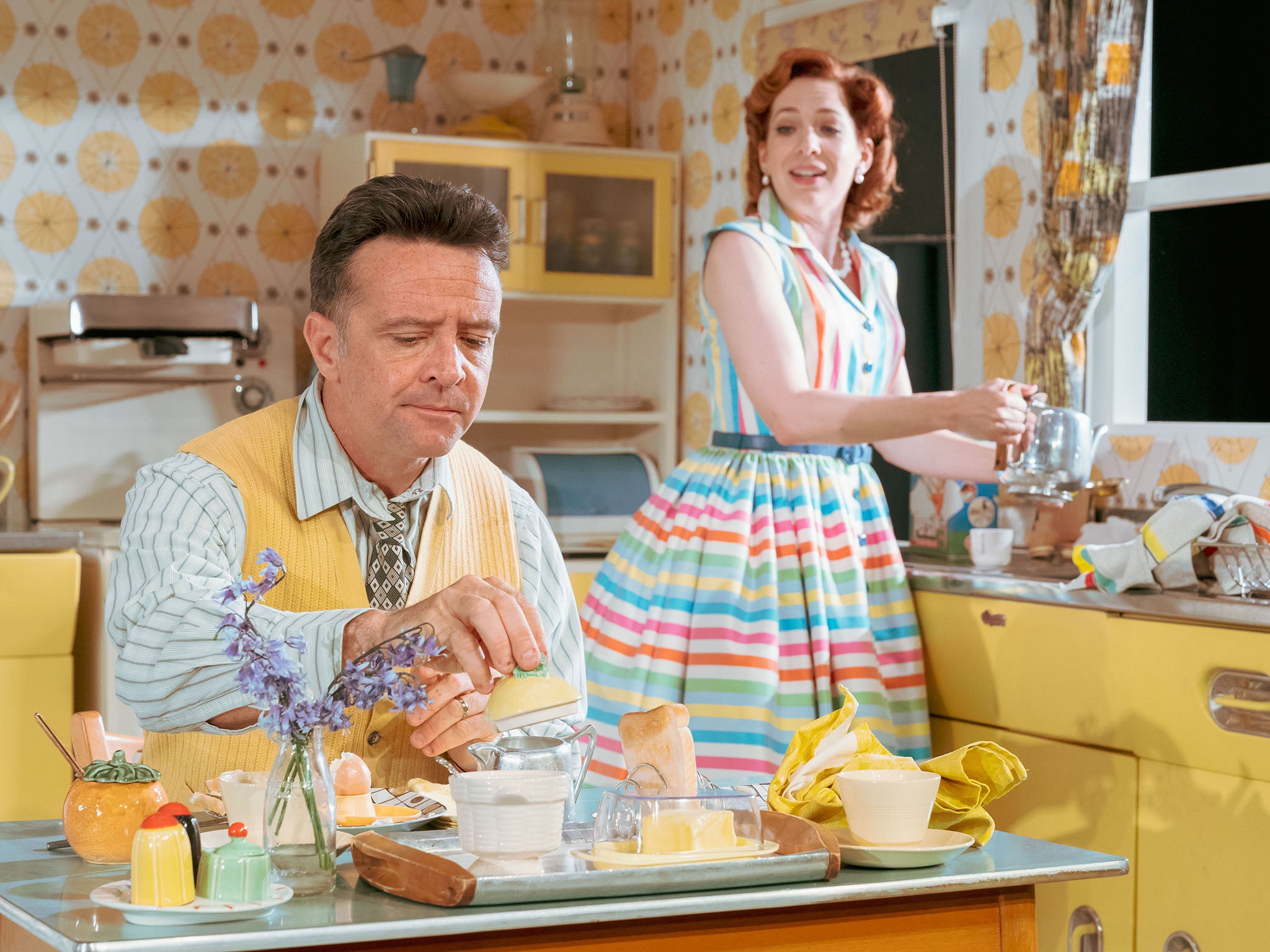Home, I'm Darling, National Theatre, London, review: Sharp, funny and sad - and well worth a ticket
Laura Wade's first original play since Posh sees 38-year-old Judy's doomed attempt to achieve marital bliss by becoming a 1950s-style Domestic Goddess

Your support helps us to tell the story
From reproductive rights to climate change to Big Tech, The Independent is on the ground when the story is developing. Whether it's investigating the financials of Elon Musk's pro-Trump PAC or producing our latest documentary, 'The A Word', which shines a light on the American women fighting for reproductive rights, we know how important it is to parse out the facts from the messaging.
At such a critical moment in US history, we need reporters on the ground. Your donation allows us to keep sending journalists to speak to both sides of the story.
The Independent is trusted by Americans across the entire political spectrum. And unlike many other quality news outlets, we choose not to lock Americans out of our reporting and analysis with paywalls. We believe quality journalism should be available to everyone, paid for by those who can afford it.
Your support makes all the difference.★★★★
Who says that nostalgia ain’t what it used to be? Retro-fetishists have never had it so good. Take Judy and Fran. They love trawling ebay for vintage New Look frocks and look forward to their annual trip to Jivestock, a festival for fans of Fifties dance.
But Fran and husband Marcus treat all this as just a keen hobby. It’s not an entire way of life as it becomes for 38-year-old Judy when she’s offered voluntary redundancy from her job in corporate finance. She elects to become a Domestic Goddess, 1950s-style – cleaning, baking, ironing (a pinny over her immaculate hand-sewn dresses) and waiting to hand a cocktail to her estate agent spouse, Johnny (Richard Harrington), when he walks through the door each evening.
Home, I’m Darling is Laura Wade’s first original play since Posh, her 2010 satire on the riotous Bullingdon Club and class division. It’s a sharp, funny and sad dissection of a doomed attempt to achieve marital bliss by retreating into a delusional cocoon. The play is wittily alive to the absurd contradictions in say, surfing 1950s forums on the internet for tips on such retrograde activities as descaling taps with lemon juice.
Judy insists that she’s a feminist: “This is what I have chosen,” she tells her sceptical ex-hippy mother (a wonderfully withering Sian Thomas) who doesn’t mince words about Judy’s “gingham paradise” nor on the privations of actually living in the decade. But while this experiment might save Judy from the hassle of juggling career and housework, how feminist is it to submit to financial dependence, after having been the major “provider” in this marriage? Money is running out; Johnny feels a strained desire for the younger female boss (Sara Gregory) who has passed him over for promotion; the loathsome Marcus (excellent Barnaby Kay) tries to exploit the situation in a way that suggests his PA is not fabricating her allegation of “inappropriate physical contact”.
The brilliant Katherine Parkinson treads a tricky tightrope between the comic and the desperately poignant in Tamara Harvey’s accomplished and generous-spirited production. Her declarations of happiness increasingly sound like choked-back sobs as she fights to keep up the pretence that this is a retro-utopia rather than a prison.
The character may make mistake after mistake but neither the play nor production ever allow you to look down on her. A flashback to three years earlier at the start of the second act lets you see how how the project began and throughout you hear enough about the psychological background (an acrimonious parental divorce and unhappy teenage years spent with her mother in a squalid commune) to make her drastic reaction seem pathologically comprehensible rather than outright lunatic.
The bleakness is balanced by drive and buoyancy in Harvey’s production which has the initially less complex couple, Fran and Marcus, jiving to Fifties hits as they help to set up each of the scenes.
Kathryn Drysdale is a delight as the easygoing Fran who admits that the “longest recipe I used this week was ‘Pierce Film Lid’”, the actor also beautifully showing you her struggle to maintain the belief that Marcus is a victim of the #MeToo movement. Nothing is said about women who stay at home to look after children or care for elderly relatives, and not enough about why Judy and Johnny have opted for a childless existence.
Not everyone has the luxury of making Judy’s would-be political gesture. Anna Fleischle’s lovingly detailed throwback set with its cutaway walls (Judy even seems to have colour-coordinated Johnny’s waistcoat with her butter-yellow kitchen) alerts you to the irony that, more than a century after Ibsen’s Nora slammed the door on it, here’s a heroine who thought it would be feminist flourish to barricade herself back into a doll’s house.
Additional tickets for this sold-out production – which started life at Theatr Clwyd – are being made available by the National on Friday Rush and Day Ticket. Well worth trying to secure one.
Until 5 September (nationaltheatre.org.uk)
Join our commenting forum
Join thought-provoking conversations, follow other Independent readers and see their replies
Comments